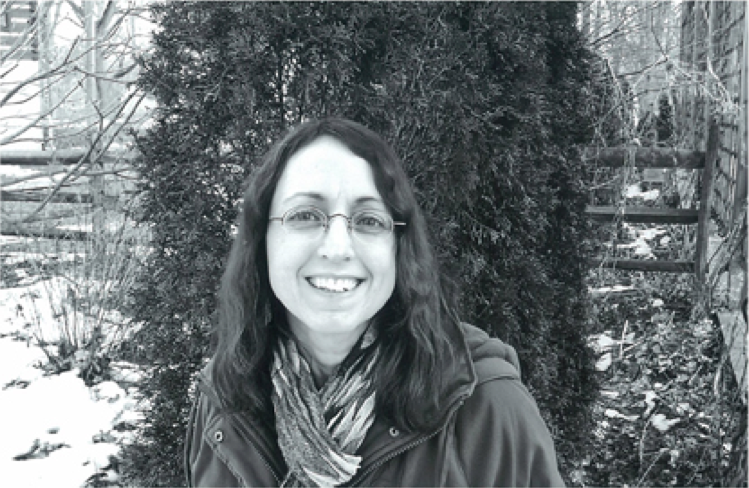The Acrobats
Four or five to a book and all of us
in bifocals, we edge close to a ladder
we’re crowding to climb. “Let’s sing
“Trust and Obey” Aunt Doris calls out.
“And then 214 ‘O Sacred Head
Now Wounded,’” adds Aunt Marty,
who, like me, prefers what slants
toward a dark loft. Jan tosses us
an arpeggio from the piano
then holds down the notes as we
scramble to our places. Years ago
it was my mother with the pitch pipe
and most of us, children, craning
to see the words. Before they could
even read, my cousins harmonized,
leaping from soprano to alto to tenor
while I clutched the high rung of melody
and held on as I still do. “Let’s sing
that line again and pick up the tempo,”
says my mother who doesn’t like
any song to drag. She jumps down
to help the men on tenor, then soars
to finish the last note of the chorus
with me and her younger sister—all of us
letting go until we’re nothing
but a human cord balanced
on the taut rope of our breath.
Speculations on an Ancestral Poet
“I can’t be a poet,” Amos Miller said,
“and still be Mennonite.”
So when he stepped off the family stoop
they never heard from him again—
not even a penny postcard
from California.
I like to think he made it
to where flowers thrive in winter.
He changed his name to something
less farm-like and when people asked
where he was from, he lied
and said, “Chicago.”
But when he tried to write
aubades near the ocean, waves
turned pink as the peonies
at the edge of his mother’s garden.
Killdeer kept rising from a field
that never should have been there.
No one wanted to read about plain-collars
hooked too tight or the toughened feet
he’d bent to wash in white enamel basins.
Eyes of beech trees loomed behind bougainvillea.
Wind would not be wind but the breath
of God snuffing out the candle
while he slept.
So he gave explicit directions
for his poems to be destroyed.
His friend took him at his word
and now, in death, Amos mourns
the immortality that could have been.
He’s interested in my work,
peers over my shoulder or paces the floor.
This makes me think he never wrote.
Lack of discipline made him a failure
on the farm. Women in San Francisco
beckoned from doorways
and he never came out.
Or what I fear more: he desired
the romance of being a poet,
hob-nobbing with writers who assumed
he had talent but then saw his verse
as a sappy imitation of Keats.
Before Stevenson set sail for his island,
he told Amos to give up writing
and bend his back to a shovel.
Tonight Amos could be a dignified Poe
with the Rook card poking out
from the cuff of his sleeve.
Whether he was a poet is not what ultimately
matters in this suburban room
where I type. Amos wants me to write
as if my words could call the cows
from the shadows and into the barn
where he’ll hold the lantern
as I finish his chores.
Genealogy
On my mother’s side there were crock pots
full and running over, counters crammed
with casseroles, mashed potatoes and chewy
noodles, slices of ham steaming up
to heaven, salads drenched in sauces, date
pudding, whoopee-pies. Elbow
to elbow, we gorged and later snacked
on sugar cookies dunked in coffee. The earthy
aroma of cows permeated even the kitchen
and sheets smelled faintly of their bodies
bedded down in straw. My husband
was stunned to hear our dinner conversation—
the digestive disorders of infants, the hues
of diarrhea in diapers. Nothing human
or from the barn could subdue our appetites.
My mother packed Hershey chocolate bars
beneath our underwear and socks
when we visited my father’s parents.
For Sunday dinner, we dined upon curried
chicken mixed with rice on china plates
and there was just enough so we never had
leftovers to put away. For dessert, picture
a goblet of frozen strawberries with a scoop
of ice milk. My grandfather was a gentle scholar
who hummed hymns even as he balanced
on ladders, painting barns in August heat.
If I gave him a walking stick and a robe,
he could be a Taoist monk treading
the steep path in a Chinese painting. There was
the silence of books, the delicacy of African
violets that bloomed all winter. In the basement
I read Uncle Arthur’s Bedtime Stories—
true-life tales of children who saved siblings
by giving up their coat on a stranded bus
or by reaching through the ice.
The Hostetler Family History told
of ancestors massacred when they refused
to raise their rifles.
At the farm, with the frantic flurry
of Dutch Blitz, it was hard to read
even in a corner. But beneath stacks
of John Deere magazines, I discovered
a paperback of Cousin Myron’s: Perseus
clutching the head of Medusa
on the cover and Edith Hamilton sporting
a goatee on the back. I read of gods
with appetites and mortals who assumed
the shapes of slender trees. My cousin said
I could keep it and I still do
between Shakespeare and the Complete
Writings of Menno Simons.
I used to think it was a curse to fit
in neither world—to feel like an ascetic
intellect among my mother’s clan
or a hedonist among my father’s saints.
But from such wrestling with angels
or ravenous bears comes a blessing
if the one in the wilderness remains all night
with what she fears could consume her
and does not let go.
